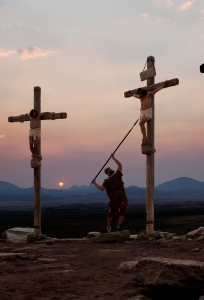
This is part 2 of 2. Part 1 is here.
ὧδε δέ τις εἴπεσκε νέων ὑπερηνορεόντων·
“εἰ μὲν δὴ θεός ἐσσι, θεοῖό τε ἔκλυες αὐδὴν
καί πού τις δοκέεις μέγας ἔμμεναι ἠδὲ κραταιός,
ἔρξον ὅπῃ δή τοι νόος ἔπλετο, μηδ’ ἔτ’ ἐρώει.
ἀλλὰ τά γ’ οὐ κατὰ κόσμον, ὀΐομαι, οὐδέ με πείσεις,
ὦ ξεῖν’· οὕτω γὰρ νύ τοι εὐκλείη τ’ ἀρετή τε.
εἰπέ μοι εἰρομένῳ—ξεῖνος δέ τοι εὔχομαι εἶναι—
εἰ ἐτεὸν θεός ἐσσι, θεοῖό τε ἔκλυες αὐδήν.”
ὣς ἄρα τις εἴπεσκε καὶ οὐτήσασκε παραστὰς
νείατον ἐς κενεῶνα, ὅθι ζωνύσκετο μίτρην,
καί τι ἔπος προέηκεν, ὅπερ τ’ ἄρρητον ἄμεινον.
αὐτίκα δ’ ἔρρεεν αἷμα κελαινεφὲς ἐξ ὠτείλης,
νηπενθές τ’ ἄχολόν τε, κακῶν ἐπίληθον ἁπάντων·
τοῦτό νυ καὶ γέρας οἶον ὀϊζυροῖσι βροτοῖσιν,
οὐδέ τί οἱ θάνατον προτιόσσετο θυμὸς ἀγήνωρ,
ὃς τὸ καταβρώξειεν ἐπὴν κρητῆρι μιγείη.
νειαίρῃ δ’ ἐν γαστρὶ πάγη δολιχόσκιον ἔγχος
ἄκρον ἐπιλλίγδην, γράψεν δέ οἱ ὀστέον ἄχρις
—σχέτλιος, ὀβριμοεργός, ὃς οὐκ ὄθετ’ αἴσυλα ῥέζων—
†εἶθαρ δὲ δόρυ χροὸς ἀντετόρησε, ῥέε δ’ ἄμβροτον αἷμα θεοῖο,†
ἰχώρ, οἷός πέρ τε ῥέει μακάρεσσι θεοῖσι.
τῷ δὲ μάλ’ ἐν πείσῃ κραδίη μένε τετληυῖα
βλημένῳ· οὐδ’ ἄρα δάκρυ χαμαὶ βάλεν ἐκ βλεφάροιο,
ἀλλ’ ἀκέων πατέρα προσεδέρκετο, δέγμενος αἰεί,
εὐξάμενος δ’ ἄρα εἶπεν ἰδὼν εἰς οὐρανὸν εὐρύν·
“ὦ Πάτερ, ἦ μέγα θαῦμα τόδ’ ὀφθαλμοῖσιν ὁρῶμαι·
οἷον δὴ ἄνδρεσσι χαρίζεαι ὑβριστῇσιν,
οἵ τέ με ὑβρίζοντες ἀτάσθαλα μηχανόωνται.”
(Patricius(?), Homerocentones 44.53-80)
And thus would one of the proud youths speak: “If you are indeed God, and have listened to the voice of God, and if perhaps you think you are some great and mighty man, act as your mind is set and hold back no longer! But in this, I think, you have not spoken rightly, nor shall you persuade me, stranger; so indeed should you win good repute and prosperity. Tell me what I ask—for I declare that I am a friend of your house—if you are indeed God, and have listened to the voice of God.” Thus would one speak, and coming up would deal a wound against the lower portion of his belly, where he was girded with his apron, and he would sometimes bring forth a word which were better left unspoken. And immediately dark blood flowed from the wound, quieting pain and strife, and bringing forgetfulness of every ill; this is, to be sure, the only due that is paid to miserable mortals, and never does the proud spirit forbode death of whoever should drink this down, when it is mingled in the bowl. In the lower belly was the far-shadowing spear fixed, a glancing blow, but it cut clean to the bone—harsh man, worker of violence, who did not hesitate to do these evil deeds!—and immediately the spear pierced the flesh and out flowed the immortal blood of God, the ichor, such as flows in the blessed gods. And for him in utter obedience his heart remained enduring as he was struck; and he let no tear fall from his eyelids to the ground, but in silence watched his father, constantly waiting, and he spoke in prayer, looking up to the broad heaven: “Father, indeed this is a great marvel that my eyes behold; in such a way now you favor men of violence who in wantonness devise mischief against me!” (tr. David Bauwens; based on August Taber Murray’s translation of the Iliad as revised by George E. Dimock)

